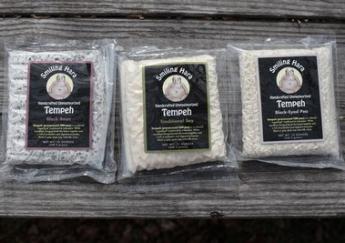The investigation into the source of Salmonella Paratyphi B linked to Smiling Hara Tempeh now focuses on a Maryland company who distributed a fungal starter culture used to make the product. According to the Citizen-Times, North Carolina Dept of Agriculture and Consumer Services identified the distributor as Tempeh Online of Rockville MD.
A culture starter for tempeh, a bean product popular in vegetarian cuisine, was found to have the same type of salmonella that caused a county outbreak beginning as early as February, lab work by the N.C. Department of Health and Human Services confirmed Thursday.
The Rockville, Md., company, Tempeh Online, sold the starter culture to Smiling Hara Tempeh, which made the meat substitute in Candler.
Federal regulators have been involved, and the Buncombe County Health Department on Thursday said it is continuing to investigate.
“The U.S. Food and Drug Administration is already involved in tracing the origin of the ingredient to identify (the) source of contamination as well as the potential for other salmonella outbreaks in the U.S.,” according to a release from the Health Department. FDA spokesman Curtis Allen could not be reached for comment Thursday afternoon. Allen has said the administration has a policy against naming companies behind outbreaks.
State Department of Agriculture spokesman Brian Long had identified the distributor as Tempeh Online but said he didn’t know the producer of the culture, which is made up of fungal spores. Long said his department was in touch with the FDA, trying to find out if other tempeh makers in the state are using the culture. “We are concerned whether other tempeh makers in North Carolina are using this culture, but we haven’t received any distribution records from FDA, which would first have to review the maker’s and distributor’s records,” he said.
Smiling Hara Managing Executive Chad Oliphant said he began buying cultures from Tempeh Online after his regular company ran out.
On April 26, after state agriculture inspectors found the possibility of salmonella in Smiling Hara’s tempeh, Oliphant said he contacted the company. “Once this thing came up, I contacted him and he wasn’t really forthcoming in the conversation,” he said.
The Citizen-Times reports that the distributor could not be contacted and a call to a number listed on their website (which has since been taken down – but can be seen here with some internet magic) was answered but "said the the number was wrong and hung up after learning he was speaking with a reporter." Doesn’t seem like Tempeh Online is employing a positive food safety culture – they would be forthcoming with risk-reduction steps, sympathetic towards those affected by the outbreak and would be infoming customers/recalling their products to avoid similar incidents.

